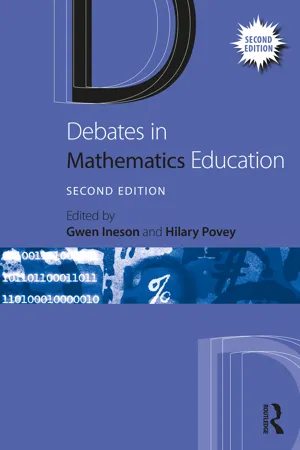
- 292 pages
- English
- ePUB (mobile friendly)
- Available on iOS & Android
Debates in Mathematics Education
About this book
This new and updated second edition of Debates in Mathematics Education explores the major issues that mathematics teachers encounter in their daily lives. By engaging with established and contemporary debates, this volume promotes and supports critical reflection and aims to stimulate both novice and experienced teachers to reach informed judgements and argue their point of view with deeper theoretical knowledge and understanding.
Divided into five accessible sections, this book investigates and offers fresh insight into topics of central importance in mathematics education, with this second edition including new discussions and chapters on:
- Classic and contemporary issues of pedagogy, politics, philosophy and sociology of mathematics education
- International comparisons of achievement
- Digital technologies for teaching
- Mastery in mathematics
- Pop culture and mathematics
- Whether mathematics can be harmful
Designed to stimulate discussion and support you in your own research, writing and practice through suggested questions and activities throughout, Debates in Mathematics Education will be a valuable resource for any student or practising teacher, and those engaged in initial teacher education, continuing professional development or Master's level study. This book also has much to offer to those leading mathematics departments in schools and initial teacher education programmes, and to beginning doctoral students looking for a survey of the field of mathematics education research.
Tools to learn more effectively

Saving Books

Keyword Search

Annotating Text

Listen to it instead
Information
Index
Table of contents
- Cover
- Half Title
- Series Page
- Title Page
- Copyright Page
- Contents
- List of illustrations
- List of contributors
- Introduction to the series
- Introduction to the volume
- Preface
- Acknowledgements
- SECTION ONE Debates about international comparisons
- SECTION TWO Debates about social justice
- SECTION THREE Debates about classroom matters
- SECTION FOUR Debates about mathematics teaching and social content
- SECTION FIVE Debates about assessment
- Index
Frequently asked questions
- Essential is ideal for learners and professionals who enjoy exploring a wide range of subjects. Access the Essential Library with 800,000+ trusted titles and best-sellers across business, personal growth, and the humanities. Includes unlimited reading time and Standard Read Aloud voice.
- Complete: Perfect for advanced learners and researchers needing full, unrestricted access. Unlock 1.4M+ books across hundreds of subjects, including academic and specialized titles. The Complete Plan also includes advanced features like Premium Read Aloud and Research Assistant.
Please note we cannot support devices running on iOS 13 and Android 7 or earlier. Learn more about using the app